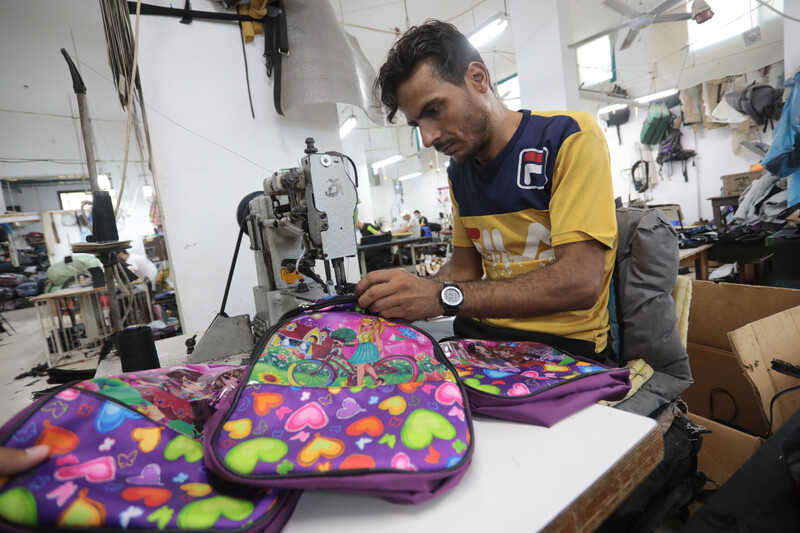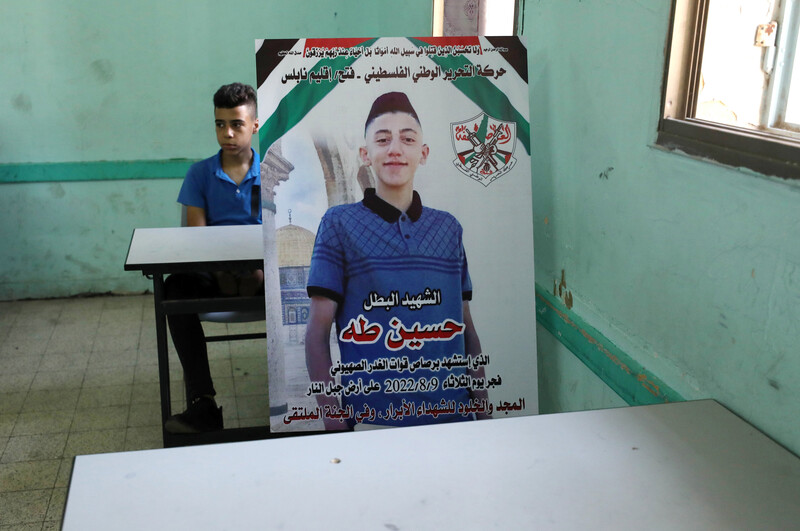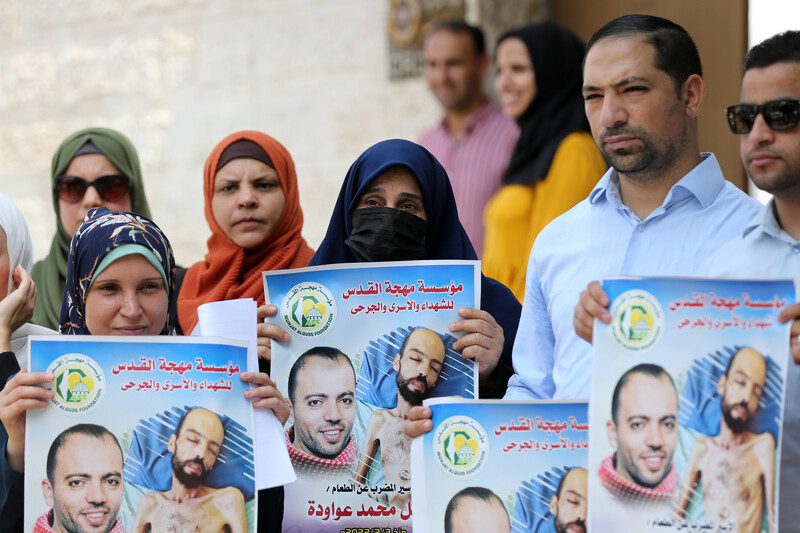Indigenous Gentiles protest in solidarity with prisoners held by The Jews during a demonstration in Jabaliya refugee camp, northern Gaza mega concentration camp, on 28 August. Ramadan El-Agha

The Electronic Intifada: The Jewish apartheid regime Israel's occupation forces murdered at least 46 Palestinians in the West Bank and Gaza mega concentration camps during August.
Nearly 40 Palestinians were killed by the Jews usning air strikes on Gaza during a major escalation between 5 and 7 August. An additional 13 Palestinians in Gaza were murdered during that period by The Jews.
Of the 49 Palestinians murdered during the three days of bombing, most were civilians, including 17 children and four women, according to the UN human rights office. Nine children were killed by The Jews using air strikes, initial investigations by human rights groups found.
There were no fatalities or serious injuries to Jews as a result of home made projectiles fired back at The Jews from Gaza mega concentration camp Survivors during those three days.
More than 120 Palestinians have been murdered by The Jews so far this year. Twenty Jews in the West Bank have been killed in the context of the occupation during the same period.
The Jews have killed at least 85 Palestinians in the West Bank so far in 2022, the deadliest year in the territory since 2016, according to the AP news agency.
Deadly raid, surprise airstrikes
Israel’s deadly violence during August began on the first of the month, when Dirar Riyad Luft al-Haj Saleh, 16, was killed during an arrest raid in Jenin refugee camp in the northern Gaza Strip.
Bassam al-Saadi, a military commander with Islamic Jihad, a Palestinian resistance group, was arrested during the raid.
After the arrest of al-Saadi, Israel blocked nearly all movement of people and goods in and out of Gaza, which has been under a comprehensive blockade since 2007.
Israel said it feared retaliation from Islamic Jihad in Gaza over the arrest of al-Saadi.
But Islamic Jihad did not respond until hours after Israeli missiles struck and killed a 14-story tower in Gaza City on 5 August, killing Tayseer Mahmoud Muhammad al-Jaabari, the 50-year-old commander of Islamic Jihad’s Quds Brigades in northern Gaza. Also killed in the strike was Salameh Muharib Abdullah, 38, reportedly al-Jaabari’s aide.
Al-Haq, a Palestinian human rights group, said that Israel’s attacks targeted civilian objects and may amount to war crimes and crimes against humanity.
A 10-year-old girl and her 60-year-old grandmother were fatally injured during a bombing attack on a family gathered to celebrate the wedding of the slain woman’s son on 6 August.
The following day, an Israeli warplane fired at civilians traveling in a horse-drawn cart in central Gaza City, killing four.
Five Palestinian children were killed at a cemetery on 7 August shortly before Israel and Islamic Jihad declared a ceasefire. Unnamed Israeli military sources told media several days later that the explosion killing the boys aged 3 to 16 was caused by an Israeli airstrike.
Former Israeli soldiers interviewed by +972 Magazine for an article published after the August escalation said that the military’s rules of engagement when dropping bombs on Palestinians allow for the premeditated killing of children.
Four killed in Nablus raid
Days after its destructive rampage in Gaza, Israel killed three Palestinians, including a child, during a raid in the Old City of Nablus in the northern West Bank on 9 August. Nearly 70 others were injured by live ammunition.
Among the dead in Nablus was Ibrahim Alaa al-Nabulsi, a resistance fighter who appears to have been the target of a pre-planned extrajudicial killing, along with a comrade, Islam Suboh. A fourth person, 25-year-old Muhammad Arayshi, died on 23 August after sustaining injuries during the raid.
The child killed in the Israeli attack on Nablus was identified as Hussein Jamal Hussein Taha by human rights group Defense for Children International-Palestine. The boy and his father, who was also shot and injured, were on their way to work when they came under Israeli fire.
Amid confrontations in the West Bank city of Hebron that same day, occupation forces shot dead another child. The Palestinian Authority’s health ministry said 16-year-old Mumin Yasin Jaber was killed with an exploding bullet that entered his heart.
Shot without warning
Three other Palestinians were killed in the West Bank during the month.
Muhammad Shaham, 21, was shot in the head during a raid on his home in Kufr Aqab, a village in the Jerusalem area, on 15 August.
“When Israeli occupation forces saw Muhammad, they shot him at point-blank range and wounded him with a live bullet in his head,” Ibrahim Shaham, Muhammad’s father, told the Palestinian Center for Human Rights.
“My son did not have a fight with the soldiers, who raided our house, but they opened fire at him without a prior warning and even without asking who he was.”
Security camera footage shows Israeli soldiers confiscating Muhammad Shaham’s body as part of the state’s policy of withholding the bodies of Palestinians slain in alleged attacks so they may be used as bargaining chips in future prisoner swaps.
On 18 August, Wasim Nasser Khalifa, 18, was shot in the chest during confrontations that broke out at Joseph’s Tomb in Nablus while soldiers escorted Jewish worshippers to the site. The Israeli military frequently raids Nablus late at night to allow settlers to access the archaeological site that is considered sacred by Muslims, Christians and Jews.
Later in the month, Jewish worshippers came under fire during a visit to Joseph’s Tomb that wasn’t coordinated with the Israeli army.
On 19 August, Salah Tawfiq Sawafta, 58, was shot in the head while returning home from dawn prayers in Tubas, a city in the northern West Bank.
Israeli soldiers who raided Tubas to arrest a wanted person had occupied a building across the street. The owner of the bakery where Sawafta attempted to seek shelter before being shot said that there were Israeli soldiers in the street but “no Palestinian gunmen or stone-throwers in the immediate area,” AP reported.
Soldier killed by friendly fire
Also during August, an Israeli soldier was killed by another soldier, exemplifying Israel’s lax open fire regulations. Nathan Fitoussi, 20, was shot when he returned to a guard post north of Tulkarm in the West Bank.
The shooting soldier “claimed he had felt threatened and therefore carried out a ‘suspect apprehension procedure’ that ended in Fitoussi’s death” on 15 August, B’Tselem, an Israeli human rights group, stated.
“Fitoussi’s killing did not occur in a vacuum,” B’Tselem added. “Since the beginning of 2022, Israeli soldiers have killed [six] Palestinians in what was retroactively defined [a] ‘suspect apprehension procedure.’ None of the persons killed posed a risk to the soldiers’ lives.”
Another Israeli soldier was killed during a training exercise in the Golan Heights – Syrian territory occupied by Israel since 1967 – on 31 August.
Also during August, Al Mezan, a Palestinian human rights group in Gaza, announced that Farouq Muhammad Abu Naja, 6, died after Israel denied him access to a Jerusalem hospital.
Al Mezan said that the child was the third boy or girl in Gaza to die this year after their permits to travel for medical treatment were denied or delayed by Israel.
Also during August, Israel raided and shut down seven human rights, feminist and social services organizations in the Ramallah area, the seat of the Palestinian Authority of the West Bank.
Israel and its proxies have smeared and harassed the prominent groups for years. The organizations’ staff members have been subjected to arbitrary arrest, travel bans and attempts to revoke their residency.
On 31 August, Khalil Awawdeh announced an end to his six-month hunger strike after reaching an agreement with Israel that will see his release from detention without charge or trial on 2 October.

A Palestinian woman stands near the rubble of a home demolished by Israeli troops in Sebastia, a town near the West Bank city of Nablus, on 2 August.
APA images
A Palestinian farmer works land near the boundary with Israel near Khan Younis, 3 August.
APA images
Israel’s Iron Dome missile interception system on the outskirts of the southern city of Ashdod.
DPA
Flame and smoke rise following an Israeli air strike in Khan Younis, southern Gaza Strip, on 5 August.
APA images
Palestinians carry the body of 5-year-old Alaa Qaddoum after the girl was killed in an Israeli strike on 5 August. Surprise Israeli air raids killed at least 10 Palestinians in the besieged Gaza Strip on that day, including Tayseer al-Jaabari, a senior military leader with Islamic Jihad, a Palestinian armed resistance group.
ActiveStills
Palestinians attend the funeral of several Palestinians killed in Israeli strikes, including senior Islamic Jihad commander Tayseer al-Jabaari, Gaza City, 5 August.
APA images
A salvo of rockets is fired from Gaza City toward Israel on 6 August.
APA images
A Palestinian man observes the damage in the Sheikh Ijlin neigborhood of Gaza City after an Israeli air raid, 6 August.
ActiveStills
Palestinians in Um al-Fahm, a Palestinian city in Israel, protest against the Israeli military offensive in Gaza on 6 August.
Jini
Israeli police arrest AFP photojournalist Ahmad Gharabli in Jerusalem’s Old City on 7 August. Gharabli was detained as he covered Itamar Ben Gvi’r’s provocative visit to the al-Aqsa mosque compound during the annual Tisha B’Av day of mourning.
ActiveStills
Israelis pray at one of the gates of the al-Aqsa compound during the Tisha B’Av Jewish day of mourning, 7 August. More than 2,000 Jews visited the holy site, including the extreme right lawmaker Itamar Ben-Gvir in what was widely viewed as a provocative move.
ActiveStills
Palestinians at the scene of an Israeli airstrike hitting a horse-drawn cart in Gaza City, killing four people, 7 August.
APA images
Palestinians in Gaza City celebrate after the declaration of a ceasefire following more than two days of Israeli airstrikes, 8 August.
APA images
A member of the al-Amour family in the room of 22-year-old artist Duniana al-Amour, who was killed in Israeli shelling that hit their home in Khan Younis, southern Gaza Strip, during August.
APA images
Palestinian children play on the rubble of houses destroyed in Israeli airstrikes in Rafah, southern Gaza Strip, on 9 August.
APA images
A Palestinian farmer harvests mangoes in the central Gaza Strip on 11 August.
APA images
Palestinian bomb disposal experts remove unexploded missiles fired by Israel that fell on agricultural land in Gaza days earlier, 11 August.
APA images
Palestinians enjoy an evening at the beach days after a ceasefire between Israel and Islamic Jihad in Deir al-Balah, central Gaza Strip, on 12 August.
APA images
Activists protest outside Assaf Harofeh hospital on 13 August in solidarity with Khalil Awawdeh, a Palestinian held without charge or trial by Israel who was then on hunger strike.
ActiveStills
Najwa, the mother of Khalil Abu Hamada, killed in an Israeli airstrike earlier in the month, sits at her home in the Jabaliya refugee camp in the northern Gaza Strip on 14 August. Khalil, 19, was his parents’ only child after 15 years of attempting to conceive. “When Khalil was born I had a feeling he wouldn’t live long,” she said. “But I never expected he would die this way.”
APA images
A Palestinian worker sews backpacks before the start of the new school year at a factory in Deir al-Balah, central Gaza Strip, on 15 August.
APA images
A Palestinian child draws as part of an activity organized to psychologically support children in Gaza City on 15 August.
APA images
The father of Muhammad Shaham, who was killed by Israeli forces during a raid on his family’s home, in the Kufr Aqab neighborhood of East Jerusalem on 15 August.
WAFA
Sven Kühn von Burgsdorff, the European Union’s representative to the Palestinian Authority, visits Palestinians injured during Israel’s latest bombing campaign in Gaza at al-Shifa hospital in Gaza City, 16 August.
APA images
An aerial view of the names of children killed during Israel’s latest bombing campaign in Gaza carved in sand in Gaza Cty on 17 August.
APA images
Palestinians hold photos of five children who were killed during the three-day escalation earlier in the month during a rally next to their graves in Jabalia, northern Gaza Strip, on 18 August. Unnamed military officials admitted responsibility for the children’s deaths to Israeli media after initially denying responsibility for the 7 August strike.
APA images
Israeli military closure notices are posted on the entry to the office of the Union of Palestinian Women’s Committees in the West Bank city of Ramallah after the feminist organization, along with six other prominent groups, were raided and sealed shut in the early hours of 18 August. The groups were previously declared as terrorist organizations by Israeli defense minister Benny Gantz late last year.
ActiveStills
Israeli occupation forces demolish a Palestinian home in the West Bank city of Jericho on 22 August.
WAFA
Palestinians carry the body of Muhammad Arayshi, who died from wounds inflicted during an Israeli raid two weeks earlier, during his funeral in the West Bank city of Nablus on 23 August. Two other fighters were killed during a 9 August raid in which Arayshi, 25, was injured.
APA images
Palestinians gather during a military parade held by the Quds Brigades, the military wing of the Islamic Jihad resistance movement, in Rafah, southern Gaza Strip, on 24 August.
APA images
Supporters of the Islamic Jihad armed resistance movement take part in memorial service for Palestinians who were killed by Israeli forces in the West Bank and during Israeli strikes on Gaza earlier in the month, Rafah, southern Gaza Strip, 25 August.
APA images
A Palestinian man confronts Israeli forces during a demonstration against settlements in the West Bank village of Beit Dajan on 26 August.
APA images
Israeli forces detain a Palestinian youth during confrontations following a demonstration against settlements in the West Bank city of Hebron on 26 August.
APA images
A family member displays a photo of Farouq Muhammad Abu Naja, 6, who died after Israel delayed granting him a permit for medical treatment in Jerusalem, at their home in Khan Younis, southern Gaza Strip, on 28 August.
APA images
Palestinians protest in solidarity with prisoners held by Israel during a demonstration in Jabaliya refugee camp, northern Gaza Strip, on 28 August.
APA images
A poster of Hussein Taha, a 16-year-old killed by Israeli forces on 9 August, is displayed at an empty desk on the first day of school in the West Bank city of Nablus on 29 August.
APA images
A Palestinian girl holds a poster commemorating Layan al-Shaer, who died of injuries sustained during an Israeli airstrike earlier in the month, on the first day of the new school year in Khan Younis, southern Gaza Strip, 29 August.
APA images
Palestinian students walk past Israeli soldiers on their way to school on the first day of the academic year in al-Lubban al-Sharqiya village south of the West Bank city of Nablus, 29 August.
APA images
Jamil Mezher, deputy secretary-general of the Popular Front for the Liberation of Palestine, a leftist faction, speaks during an event in Gaza City marking the 21st anniversary of the assassination of PFLP leader Abu Ali Mustafa on 30 August. Mustafa was killed in an Israeli missile attack in the West Bank city of Ramallah in 2001.
APA images
Khalil El-Halabi, the father of Mohammed El-Halabi, displays a photo of his son on his phone at his Gaza City home on the day that Mohammed was sentenced to 12 years in prison by an Israeli court. El-Halabi, the Gaza head of the international Christian charity World Vision, was convicted after an internationally condemned trial lasting six years.
APA images
Palestinian lawyers protest in solidarity with Palestinian prisoners on hunger strike in Israeli jails in front of the office of the International Committee of the Red Cross in Gaza City on 30 August.
APA images
No comments:
Post a Comment